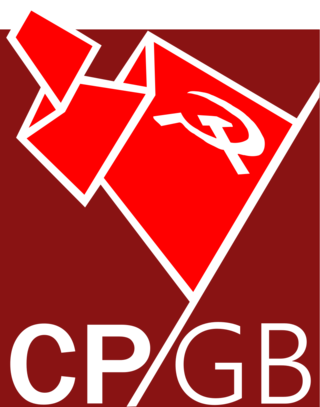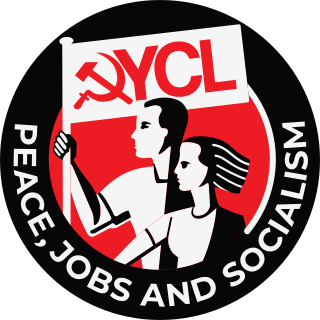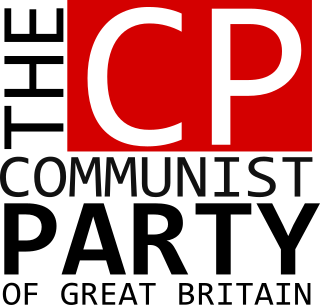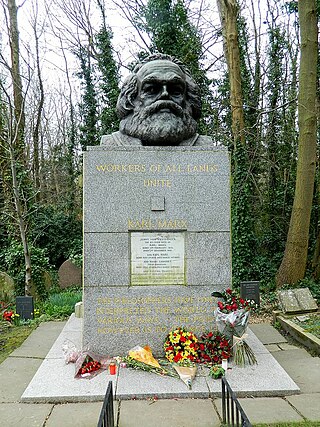Related Research Articles

The Independent Labour Party (ILP) was a British political party of the left, established in 1893 at a conference in Bradford, after local and national dissatisfaction with the Liberals' apparent reluctance to endorse working-class candidates, representing the interests of the majority. A sitting independent MP and prominent union organiser, Keir Hardie, became its first chairman.
The Communist Party of Scotland was a communist political party based in Scotland. It was established in January 1992 by former members of the Communist Party of Great Britain who disagreed with the CPGB's disbanding and reforming in 1991 as the Democratic Left think-tank. The party was itself dissolved in the late 2010s.

The Communist Party of Great Britain is a political group which publishes the Weekly Worker newspaper. The CPGB (PCC) claims to have "an internationalist duty to uphold the principle, 'One state, one party'. To the extent that the European Union becomes a state then that necessitates EU-wide trade unions and a Communist Party of the EU". In addition, it is in favour of the unification of the entire working class under a new Communist International. It is not to be confused with the former Communist Party of Great Britain, the Communist Party of Great Britain (Marxist–Leninist), or the current Communist Party of Britain.

The New Communist Party of Britain is an anti-revisionist Marxist–Leninist communist party in Britain. The origins of the NCP lie in the Communist Party of Great Britain from which it split in 1977. The organisation takes an anti-revisionist stance on Marxist–Leninism and is opposed to Eurocommunism. After the fall of the Soviet Union the party was one of two original British signatories to the Pyongyang Declaration in 1992. It publishes a newspaper named The New Worker.

Democratic Left was a post-communist political organisation in the United Kingdom during the 1990s, growing out of the Eurocommunist strand within the Communist Party of Great Britain and its magazine Marxism Today.
Straight Left was a left-wing newspaper published from 1979. The phrase was also the generic name given to a political faction of the Communist Party of Great Britain who disagreed with the leadership's emerging Eurocommunist politics, and were responsible for the production of the newspaper. The origins of this faction within the CPGB go back earlier, but it emerged under this name in 1977.

The International Socialist Group was a revolutionary socialist organisation based in Scotland which was formed in April 2011 by former members of the Socialist Workers Party. The group produced a free monthly broadsheet and online blog, Communiqué. The ISG participated in a number of campaigns, such as the Coalition of Resistance, Stop the War Coalition and the Radical Independence Campaign. In 2015 the ISG formally dissolved with its members participating in the Scottish Left Project, the organisational process which led to the RISE electoral alliance to contest the 2016 Scottish Parliamentary elections alongside Scottish Socialist Party, individuals from the Radical Independence Campaign and other activists and trade unionists.
Socialism in Australia dates back at least as far as the late-19th century. Notions of socialism in Australia have taken many different forms including utopian nationalism in the style of Edward Bellamy, the democratic socialist reformist electoral project of the early Australian Labor Party (ALP), and the revolutionary Marxism of parties such as the Communist Party of Australia.

The Communist Party of Britain (CPB) is a communist party in Great Britain which emerged from a dispute between Eurocommunists and Marxist-Leninists in the Communist Party of Great Britain in 1988. It follows Marxist-Leninist theory and supports what it regards as existing socialist states, and has fraternal relationships with the ruling parties in Cuba, China, Laos, and Vietnam. It is affiliated nationally to the Cuba Solidarity Campaign and the Venezuela Solidarity Campaign. It is a member of the International Meeting of Communist and Workers' Parties, together with 117 other political parties. After the fall of the Soviet Union, the party was one of two original British signatories to the Pyongyang Declaration.

Socialism in the United Kingdom is thought to stretch back to the 19th century from roots arising in the aftermath of the English Civil War. Notions of socialism in Great Britain have taken many different forms from the utopian philanthropism of Robert Owen through to the reformist electoral project enshrined in the birth of the Labour Party that was founded in 1900.

The Young Communist League (YCL) is the youth section of the Communist Party of Britain. Although its headquarters is based in London, the YCL has active branches across England, Scotland, and Wales. Aside from sports and social programs, the YCL heavily focuses on publishing political literature, with its own political journal called Challenge.

The Radical Independence Campaign (RIC) is a grassroots organisation which advocates for Scotland to become a republic, independent of the United Kingdom.

The Communist Party of Great Britain (CPGB) was the largest communist organisation in Britain and was founded in 1920 through a merger of several smaller Marxist groups. Many miners joined the CPGB in the 1926 general strike. In 1930, the CPGB founded the Daily Worker. In 1936, members of the party were present at the Battle of Cable Street, helping organise resistance against the British Union of Fascists. In the Spanish Civil War, the CPGB worked with the USSR to create the British Battalion of the International Brigades, which party activist Bill Alexander commanded.
Left Unity was a left-wing political party in the United Kingdom founded in 2013 when film director and social campaigner Ken Loach appealed for a new party to replace the Labour Party. More than 10,000 people supported Loach's appeal.
Socialist Resistance (SR) is a Trotskyist organisation in Britain. In 2009, the International Socialist Group (ISG) merged into it, making it the British Section of the Fourth International.
Aitken Ferguson was a Scottish communist activist.
David John Scott Cook was a British communist activist, also known as a rock climber.
Douglas Chalmers is a Scottish academic and former communist activist.

Far-left politics in the United Kingdom have existed since at least the 1840s, with the formation of various organisations following ideologies such as Marxism, revolutionary socialism, communism, anarchism and syndicalism.
References
- ↑ Laybourn, Keith (2006). Marxism in Britain: dissent, decline and re-emergence 1945-c.2000. Volume 3 of Routledge studies in modern British history. Taylor & Francis. ISBN 0-415-32287-1.